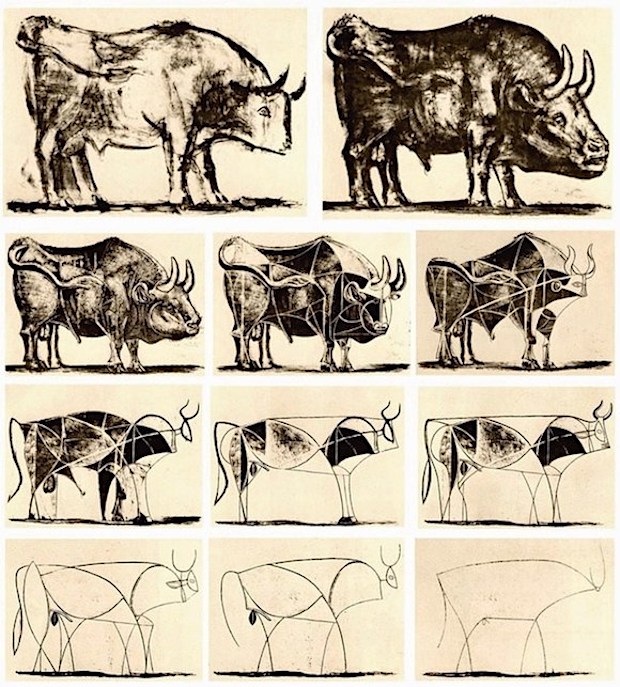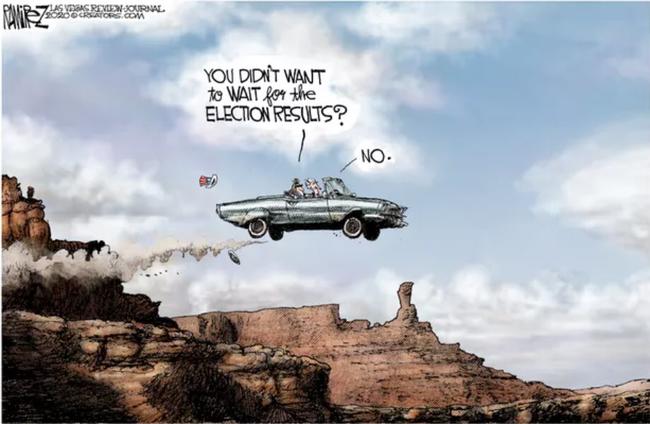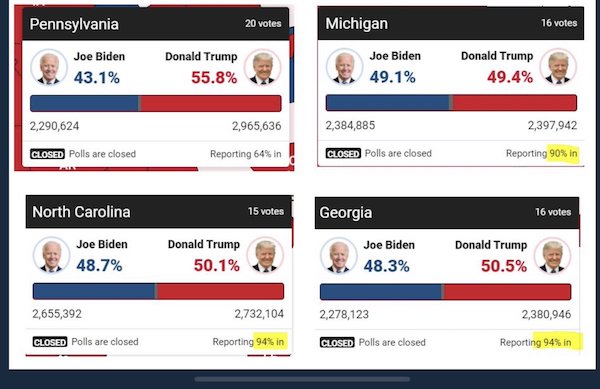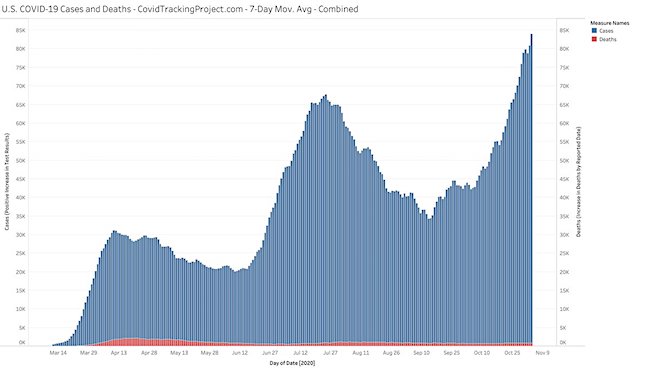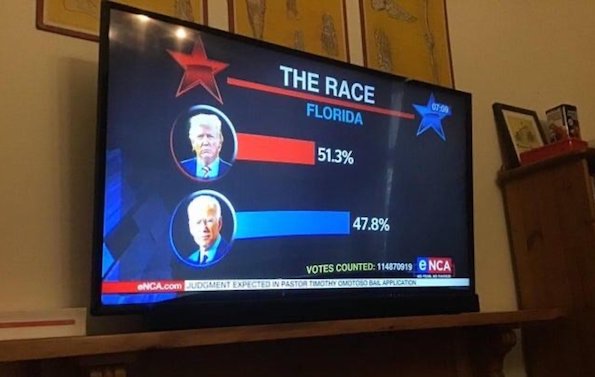
David Hockney The Pond in Autumn 1 November 2020

Since the US had no official institution to call an election soon after the polls have closed, and people want a result fast, it has befallen on the media to make the announcement. And by and large, this hasn’t been that big a deal. But when those same media have for 4 years relentlessly hounded one of the two candidates, it should be obvious that this “system” should not be applied. If only because it has no legal status whatsoever.
However, people both in the US and abroad don’t appear to be aware of this. So when the New York Times et al declare a winner, this is seen as an “official” announcement. It is not. That won’t come until the Electoral College gathers in December (8-14th?!). And at least until then, Trump will have every right to contest the election in court. Still, “world leaders” are congratulating the “next president”. Do they really not know how this works?
The idea behind it all is obvious, of course: to make Trump look like a sore loser, and Biden the president-elect, a title the media claim they can bestow upon him. Do remember that both Biden’s and Kamala’s campaign were considered dead in the water at one point, before they were magically resurrected by the party machine, which ensured that two people very unpopular in their own party now lead the ticket. Be careful what you wish for.
In that light. I found this intriguing. Twitter adds a warning to this Trump tweet: “Official sources may not have called the race when this was Tweeted”. I haven’t seen one instance where they attached the same warning to tweets about Biden winning and being President Elect. But wouldn’t that be the same thing?
I WON THIS ELECTION, BY A LOT!
— Donald J. Trump (@realDonaldTrump) November 7, 2020

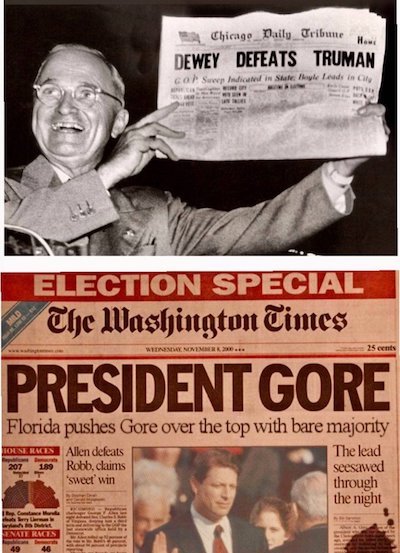



From one of Trump‘s lawyers.
• Winner of Trump-Biden Race Will Be Determined By Courts (Jenna Ellis)
Despite projections by many news organizations Saturday that former Vice President Joe Biden has won the presidential election and defeated President Trump, the media don’t have the power to decide the outcome of American elections. Legal challenges by the Trump reelection campaign, where I serve as a legal adviser, are still before the courts and we await judicial rulings on our challenges. In other words, as the late baseball great Yogi Berra said in 1973, referring to the National League pennant race: “It ain’t over till it’s over.” We all want to know who will be president for the next four years. But all Americans should want accurate results above all, no matter who they supported in the race.
So it’s important for everyone to realize that Trump campaign legal challenges must be resolved in the courts before we have an official and legally binding decision on who won the 2020 presidential election. President Trump will continue fighting to ensure a fair and accurate election result. He is right to do this, because it’s vital that we keep our elections free and fair. As Americans, we should all be able to recognize that our rule of law governs and our election process works accurately. For President Trump, the Trump 2020 campaign and the Republican National Committee, the rule of law, fundamental fairness and accuracy in election results are the goals. None of the legal fights we are waging are novel arguments or anything more than an effort to ensure a fair and accurate election outcome.
Our nation went through a legal challenge to the results in Florida during the 2000 presidential election between then-Texas Gov. George W. Bush and then-Vice President Al Gore, for example. Twenty years ago, some news organizations prematurely said Gore won that very close election and would become the next president of the United States. Those news organizations later pulled back their projections. Legal challenges by the Bush campaign went all the way to the Supreme Court. The nation’s highest court determined that George W. Bush won the election. Imagine how different history would have turned out if Bush has simply thrown in the towel as soon as he heard someone on TV say Gore won the race.
Bill Binney
(29)if what our President said about 100,000 late votes (all for Biden)is true,(Eg. DNA evidence)if for every 1000 votes only one voted for Trump means the random chance of that all being for Biden is 1 in 1 followed by 200 zeros.
two hundred zeros. DNA is 1 in a billion.— Bill Binney, Constitutional Patriot (@Bill_Binney) November 8, 2020
(30)follow-on to my 29. This is 1 chance in 1billion times 1billion times 1billion times etc for at least 20 times.
This is direct evidence of ballot stuffing. This should certainly be evidence for courts to require a recount with validation or else through them all out.— Bill Binney, Constitutional Patriot (@Bill_Binney) November 8, 2020

Molly McCann is on Sidney Powell’s team.
• Nov. 7 – Biden Hasn’t Won Yet; Trump Has A Path(s) (McCann)
The media called the election today, as many predicted would happen. As noted yesterday, the media and the Democrats were desperate to call it. They want to shift momentum to Biden and frame Trump as a sore loser, and worse, a despot attempting a coup. This election is still in play. Arizona is not fully in yet, and Trump continues to close his margin there. The latest results were still breaking for Trump with the margins he needs to close the gap and take the state. We’ll see. Georgia is going to go to a recount no matter what. Pennsylvania is a disaster zone…for the Democrats. I’m not sure if the 100,000 provisional ballots have been counted yet, but they hadn’t been counted when they called the election for Biden. Those could swing Trump back into the lead in PA. There is still so much at play. Are we looking at razor-thin margins? Yes. Has Biden won yet? No. If we could hold Georgia and Arizona outright, I think we could knock out Pennsylvania at SCOTUS. This is the actual electoral map right now:
Main stream media does not declare presidents. Here is how the electoral map should currently look based on: 1. states not being done counting, 2. recounts being mandated and therefore no winner declared, 3. litigation @270toWin https://t.co/d6HkNIlaxu #2020election
— American Contingency (@americancont) November 8, 2020
So, does Trump have a path forward? Yes. First of all, Trump could still win in a relatively traditional manner. Because remember, even though the media is demanding Trump concede, recounts in elections happen with relative regularity. People contest results and we go through processes to make sure everything is above board. 2020 is election insanity on an unprecedented scale (I think), but procedurally, this is not some crazy aberration in politics or elections. So, Trump might still be able to win traditionally, and I pray he does. But it might take more than that.
If we lose Arizona and Georgia and Pennsylvania, then Trump will have to kick it up a notch. He’ll need to block certification and pursue more aggressive measures to win. It should go without saying that I am advocating legal aggressive measures, but given the present circumstances, perhaps best to clarify. I hope he pursues some of those options sooner rather than later.

“Biden is running for president in name only. He has never been that bright. He has accomplished little in his almost fifty years in public service. He is physically frail and clearly suffering acute cognitive decline.”
• Life Under Biden (Jim Rickards)
This was a historic, turning-point election. Turning-point elections are the most historic because they put the country on a different path: Party Politics in 1800, Populism in 1828, Civil War in 1860, Liberalism in 1932, and Conservatism in 1980. Every 100 years, America gets a president who shakes the establishment and cleans out the Washington sewers. In the 1800s it was Andrew Jackson. In the 1900s it was Teddy Roosevelt. In the 2000s, it’s Donald Trump. There is no doubt that Trump and Biden would lead America in almost opposite directions with profound consequences for the future of the country and for future elections. If Trump had won, we would have gotten more of the same, which is saying a lot.
Trump would offer more tax cuts (or at least preserve the tax cuts we’ve received). He’d offer less regulation, a major accomplishment of his first term. Trump would continue the trade war with China and expand it in ways that would move jobs back to the United States (or at least get them out of China into friendlier countries such as Vietnam and India). He would also curtail Chinese theft of U.S. intellectual property and cut off Chinese tech investment in the United States. Trump has also stopped foreign installation of sensitive 5G telecommunications systems from Huawei and ZTE, which are hidden arms of the Chinese military. Trump built alliances to constrain Chinese expansion efforts. His main breakthrough was the Quad Alliance of the U.S., Japan, Australia and India that effectively surrounds and can interdict China’s sea lanes to the Pacific and Indian Oceans.
Trump also made great strides toward Middle East peace with the first two Israeli-Arab peace treaties in twenty-five years – one with the UAE and one with Bahrain. Other peace treaties with Israel may have followed. Finally, Trump was imposing crippling sanctions on Iran that would have forced it to negotiate in good faith on its nuclear program or crush its economy in ways that would also impede its efforts at terrorism and nuclear weapons. With Trump, what you see is what you get: Lower taxes, less regulation, more jobs, no new wars, peace in the Middle East, and peace through strength in confronting Iran and China. With four more years, Trump could have accomplished his goals and perhaps be ranked among the ten most significant presidents of all time.
Biden is another matter entirely. First of all, Biden is running for president in name only. He has never been that bright. He has accomplished little in his almost fifty years in public service. He is physically frail and clearly suffering acute cognitive decline. If Joe Biden does win, he’ll be 78 years old when sworn in and 82 years old at the end of his first term. Both marks are the oldest in U.S. history for a president. Some individuals are still sharp in their late 70s. Biden is not one of them. The result is that Biden will never be president de facto. With Trump out of the picture, Democrats wouldn’t need him anymore. Steps would be taken at some point to remove him from office on the grounds of mental incapacity under the Twenty-fifth Amendment. Nancy Pelosi recently proposed legislation to set up a commission to do just that as prescribed by the U.S. Constitution.
But while he remains in office, who will be the real president in a Biden administration? There are three camps contending for power: The first camp is the Biden family led by Joe Biden’s wife Dr. Jill Biden, his son Hunter Biden, and Joe Biden’s brothers Jim Biden and Frank Biden. These are the individuals who have been enriched through association with Joe Biden by using or selling access to Biden’s power to win lucrative investment management roles, consulting engagements, construction contracts and other remunerative pursuits. The Biden family will want to keep Joe in power (with Jill Biden pulling the strings) in order to keep their shakedown operation intact and avoid scrutiny.
The second camp is led by Kamala Harris and those who control her, including the Obama crew and the Resistance. If Biden is removed under the Twenty-Fifth Amendment, Harris becomes Acting President. If Biden resigns under threat of removal, Harris becomes the president. She would be a front for the Obamas and Valerie Jarrett who would operate through a cabinet consisting of Obama family retainers including Susan Rice, Samantha Power, Sally Yates and Eric Holder.
The third camp is led by the extreme left wing of the party including Bernie Sanders, Alexandra Ocasio-Cortez (and The Squad), Elizabeth Warren and radical organizations such as BLM. This group is already embedded in the Biden campaign as part of a deal whereby Bernie Sanders agreed to end his primary campaign and endorse Joe Biden in exchange for Biden adopting most of the Sanders platform. The most likely outcome is that the Obama crew and the Bernie Bros will join forces and run the Biden family off the road. The Bidens will be allowed to keep their Chinese and Russian money and will not face any scrutiny or prosecution in exchange for going away quietly.
Healing- “burn down the Republican Party” – Jennifer Rubin
Sick. “survivors”
“It’s not only that @realDonaldTrump has to lose, his enablers have to lose. We have to collectively burn down the Republican Party. We have to level them. Because if there are survivors….they will do it again.” Jennifer Rubinpic.twitter.com/Y4FDIgKFDt
— Independent Women's Voice (@IWV) November 7, 2020

“County Worker Reportedly Submitted Two Sets Of Absentee Ballots Twice”
• Another Election Computer Glitch In Michigan Reversed (JTN)
A Michigan Republican received a welcome shock when his apparent loss at the polls was reversed due to the county’s fix of a “technical glitch” that originally had him losing the election. Adam Kochenderfer was originally declared the loser in his race against Democrat Melanie Hartman for a position on the Oakland County Board of Commissioners. The narrow race appeared to end with Hartman the winner by just 104 votes. Yet the county clerk soon discovered that a set of absentee ballots had actually been reported in the voter totals twice. Once the duplicate set was removed, Kochenderfer came out ahead by 1,127 votes.
“This is proof that our process of checks and balances works,” County Clerk Lisa Brown said after the discovery. “A methodical canvass is an essential tool to ensure an accurate count and precise results.” Kochenderfer’s was the second race in Michigan so far in which a glitch was revealed to have displayed the incorrect outcome of a race. An alleged software glitch in Antrim County, Michigan earlier this week incorrectly awarded thousands of winning votes to Joe Biden; a recount of ballots subsequently revealed Trump was the county winner.
Soros voting machines
From 2016 Election:
Smartmatic a UK company involved with Soros bought a California company that controlled voting machines in 16 states. (WA, OR, CA, NV, AZ, CO, MO, IL, WI, MI, PA, VA, LA, FL)
Very interesting…#VotingMachines #GeorgeSoros #DirtyTricks pic.twitter.com/4EHAhGHOie
— RealityExpansion (@R3alAnon) November 8, 2020

Can Trump set up that long-awaited third party?
• The GOP Did Not Carry 71,000,000+ Votes, President Trump Did (sundance)
As the republican establishment contemplates positioning themselves amid President Trump’s resolute intent to highlight a 2020 election filled with with demonstrable fraud, they would be prudent to check their political ego. President Trump has created a movement and collected the largest factual constituency of voters in the nation. This is the hill we stand upon, there is no other fallback position. As of this writing the indefatigable leader of the MAGA movement gathered 71 million votes for his re-election, and still climbing. Subtract the fraudulent and manipulated ‘mail-in’ ballots from the Biden operation and you have a reality of 71 million MAGA army members staring toward an opposition front containing battalions of cardboard cutouts.
No amount of media spin is going to change the reality of that political landscape. Regardless of whether Donald Trump’s legal arsenal is able to overcome the entrenched media operations drum-beating a deafening noise to distract from the 2020 fraud, that MAGA army is solidly behind our leader…. so consider this: If President Trump takes that army into a new political party of his choosing, that new party is structurally set to lay waste to any candidate within both wings of the Democrat and Republican assembly. A Trump inspired new political party can wipe out the illusion of the Democrat/Republican two-party system; specifically because much of the Trump movement consists of former democrats and brand new voters.
The MAGA coalition is the most diverse, widest and deepest part of the entire American electorate. President Trump’s army consists of every creed, color, race, gender, ethnicity and orientation. It is a truly color-blind coalition of middle America patriots and middle-class voters that cuts through the political special interest groups. Quite simply Trump’s MAGA army is the ultimate political splitter party. No Republican will ever hold office in the next decade without the blessing of President Trump; and there is absolutely no current confidence that President Trump will not lay waste to the system if the GOP acquiesces to the transparent fraud that exists behind the Biden-Harris sham.

“News channels don’t count a damn thing. They just report numbers shipped out by election offices in various counties across the country, and if CNN or any other news outfit were actually doing their jobs, they would be alert for patterns suggesting fraud in the numbers..”
• The Kafka Election: Finding a Way Out of the Maze (Miele)
The 2020 election is a nightmare from which I — along with millions of others — am trying to awake. Like many dark dreams, it is uncertain exactly what is happening. Phantasmic ballots come and go. Seemingly insurmountable Republican victories disappear into the mouth of a vote-munching machine and come out the other side as excremental — oops, I mean incremental — Democratic leads just beyond the reach of a recount. And as in any nightmare worth its salt, just when you think it’s about to end, a new trap door opens and you fall into yet one more level of confusion and chaos in a maze with no exit in sight. But this is America. It’s not supposed to be a Kafka novel.
So how did we get to a place where, days after the election was held, despite many proclamations by news organizations to the contrary, we still don’t know who won, we don’t know who voted, and we don’t know for sure whether the rules were followed in either voting or counting? Various irregularities have been reported in five big cities, all in strategic states, and particularly in Detroit, Mich.; Philadelphia, Pa.; Atlanta, Ga.; Milwaukee, Wis.; and Las Vegas, Nev. The allegations range from mysterious ballot drops that seem to show tens of thousands of votes for Joe Biden and zero votes for President Trump, inexplicable record turnouts in late-counting counties (all Democrat-dominated) that far surpass turnouts in counties in other states where the votes were counted on a timely basis; and of course the illegal banning of election observers in those very counties where the most outrageous anomalies are reported.
Democrats tell us that there is nothing to see here, and the compliant media dutifully moves along, unwilling to investigate on its own or even express any concern about potential wrongdoing. Even Fox News has turned into a lapdog for the Democrat Party, calling Arizona for Joe Biden long before anyone could know for sure which way the state would turn. On Thursday night, as Fulton County was just about to swing Georgia into the Biden column, CNN’s John King arrogantly lectured Donald Trump: “Guess what, Mr. President? We’re gonna count the votes, and if they favor you, we’re gonna show that. And if they don’t, we’re gonna show that. That’s how democracy works. We’re just counting the votes.”
Um, no, that’s not the way it works. News channels don’t count a damn thing. They just report numbers shipped out by election offices in various counties across the country, and if CNN or any other news outfit were actually doing their jobs, they would be alert for patterns suggesting fraud in the numbers they report. If “just counting the votes” were all that it took to have a democracy, then Vladimir Putin’s Russia would be a glorious example of democracy, as would the Islamic Republic of Iran.

We’re 11 months into a pandemic. And still we know so little.
• Speedy COVID19 Healers Keep Producing Antibodies After Infection (F.)
New research has identified a group of Covid-19 patients who are capable of speedy recoveries and can produce protective antibodies for months after their initial infection, a finding that runs counter to a lot of recent research showing that antibody levels — and, potentially, immunity — rapidly decline following infection and points to the possibility that some people have immune systems that are better able to fight the virus. Researchers, led by a team at Brigham and Women’s Hospital, found that almost one in five coronavirus patients sustained antibody production for several months after infection, in contrast with other patients who experienced a rapid decline in antibody levels.
These patients also tended to recover faster than other Covid-19 patients, cutting their recovery time by about a third, as well as showing differences in two types of immune cell that play key roles in the immune system, the researchers wrote in Cell, a top scientific journal. It is unclear whether the findings are representative of the population as a whole, and the researchers themselves stressed that future investigations must look beyond the limited demographic they studied, with most volunteers being adult white women with mild Covid-19. Dr. Duane Wesemann, one of the researchers and an associate professor at Harvard Medical School, said the immune response of these quick healers was like an insurance policy — “it’s the immune system’s way of adding a potential layer of protection against future encounters with the virus,” he said.
Wesemann added that it was possible the findings “point to a type of immune response” that is better at dealing with Covid-19, which could be important in the fight to control the virus. Understanding how the immune system responds to Covid-19 over time is a vital component in controlling the pandemic, underpinning public health measures, treatments, and how vaccines are developed and administered. A lot of early attention has focused on antibodies, proteins produced by the immune system that can lock onto the virus, with research generally showing sharp declines following infection. These are relatively easy to study, but do not give a complete picture of the body’s immune system.
There is a lot that remains unknown about how immunity to Covid-19 works and how that changes over time. To date, many studies show sharp declines in antibody levels in the months following infection, though antibodies, or the lack thereof, do not necessarily indicate immunity to infection. Reinfections, though rare, have been reported, with some reports suggesting that the second infection is worse than the first.

This is good. A bit long and opinionated and all over the place, but a lot of useful information.
• The COVID-19 RT-PCR Test (Sacré)
All current propaganda on the COVID-19 pandemic is based on an assumption that is considered obvious, true and no longer questioned: Positive RT-PCR test means being sick with COVID. This assumption is misleading. Very few people, including doctors, understand how a PCR test works. RT-PCR means Real Time-Polymerase Chain Reaction. In French, it means: Réaction de Polymérisation en Chaîne en Temps Réel. In medicine, we use this tool mainly to diagnose a viral infection. Starting from a clinical situation with the presence or absence of particular symptoms in a patient, we consider different diagnoses based on tests.
In the case of certain infections, particularly viral infections, we use the RT-PCR technique to confirm a diagnostic hypothesis suggested by a clinical picture. We do not routinely perform RT-PCR on any patient who is overheated, coughing or has an inflammatory syndrome! It is a laboratory, molecular biology technique of gene amplification because it looks for gene traces (DNA or RNA) by amplifying them. In addition to medicine, other fields of application are genetics, research, industry and forensics. The technique is carried out in a specialized laboratory, it cannot be done in any laboratory, even a hospital. This entails a certain cost, and a delay sometimes of several days between the sample and the result.
Today, since the emergence of the new disease called COVID-19 (COrona VIrus Disease-2019), the RT-PCR diagnostic technique is used to define positive cases, confirmed as SARS-CoV-2 (coronavirus responsible for the new acute respiratory distress syndrome called COVID-19). These positive cases are assimilated to COVID-19 cases, some of whom are hospitalized or even admitted to intensive care units. Official postulate of our managers: positive RT-PCR cases = COVID-19 patients. This is the starting postulate, the premise of all official propaganda, which justifies all restrictive government measures: isolation, confinement, quarantine, mandatory masks, color codes by country and travel bans, tracking, social distances in companies, stores and even, even more importantly, in schools.
This misuse of RT-PCR technique is used as a relentless and intentional strategy by some governments, supported by scientific safety councils and by the dominant media, to justify excessive measures such as the violation of a large number of constitutional rights, the destruction of the economy with the bankruptcy of entire active sectors of society, the degradation of living conditions for a large number of ordinary citizens, under the pretext of a pandemic based on a number of positive RT-PCR tests, and not on a real number of patients.

A long review of an old topic.
• The Narrative Problem After Peak Oil (Watkins)
For most of the last decade, we have been sold a techno-utopian fairy tale about “peak oil demand.” Instead of “running out” of oil, the problem for the oil industry, we were told, was that the switch to “clean energy” and to technologies like electric cars and hydrogen-powered buses meant that demand for oil was declining. Within a decade or so, they claimed, our need for oil would disappear entirely as we ushered in a “fourth industrial revolution” based around digital products and services powered by renewable energy.
As with all narratives, there is just enough truth in this story to give it a veneer of credibility. Per capita demand for oil – and, indeed, for fossil fuels generally – has been declining. So that is you are a middle class metropolitan liberal – the kind of people who edit and write for the establishment media – you look around and notice your friends driving electric cars; you uncritically swallow the press statements of the windfarm owners; and you observe the declining per capita consumption of oil; and you tell yourself that this is peak oil demand in action. The data says something very different:
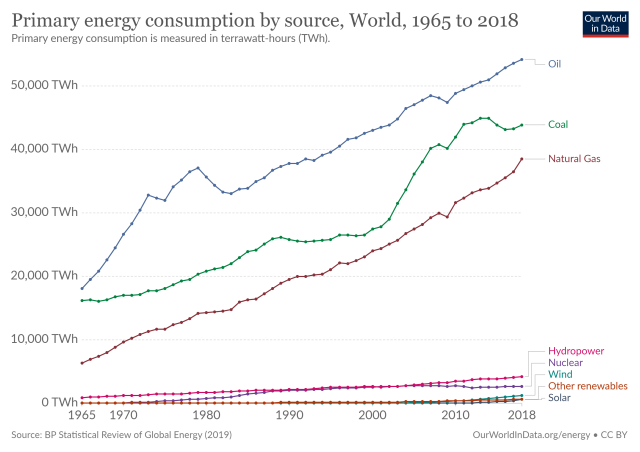
Despite a Herculean effort to bring non-renewable renewable energy-harvesting technologies online, they still account for less than five percent of global primary energy consumption. Worse still, they have not replaced fossil fuels; they have just been added to the global mix. And while developed states like Germany and the UK have gone a long way toward decarbonising their domestic electricity generation, a large part of their true pollution has been offshored to Asia. Only if they are prepared to forego all of the fossil-fuel powered goods they import can they truly claim to be embarking upon a new industrial revolution. Until then, the “green new deal” is just another name for the same old imperialism that they have always practiced.
Peak oil – including from fracking and tar sands – finally occurred in 2018. Hardly anyone noticed because – as happened in the USA in 1970 – everyone assumed that it would be a temporary blip. Oil extraction in 2019 was not substantially lower than 2018; but there was no month in 2019 when extraction was higher than it had been in November 2018. And, of course, in 2020 the world discovered more urgent issues to worry about. Nevertheless, oil extraction – and oil demand – plummeted as a result of the various state responses to the pandemic. Some wells will be shut permanently as the cost of reopening them is too high. Others will reopen, but only if the price of oil rises considerably. Pipelines and refineries will also have to be repaired. On the demand side, even the most optimistic economists and politicians have ceased talking about “V-shaped recoveries.” With Europe and parts of the USA embarking on pre-Christmas lockdowns, demand across the global economy is expected to be crushed. This spells lower rather than higher oil prices in the next couple of years.
It is in this that we glimpse the part of the peak oil story that was often overlooked by the first peak oilers. The simple assumption that falling oil production would lead to higher oil prices failed to examine the impact of oil prices on the wider economy. Nevertheless, the economy is primarily an energy system upon which the secondary financial economy is merely a claim. Rather than examining the price of oil, we have to understand its energy cost. If we begin with a certain amount of energy, then a fraction must be devoted to securing future energy. Another fraction must be set aside for maintaining the infrastructure required to keep the system running. A third fraction must be set aside to invest in the future energy supply. These, though, will only account for a small part of the energy available to us. The remainder will power the much larger, non-energy economy

We try to run the Automatic Earth on donations. Since ad revenue has collapsed, you are now not just a reader, but an integral part of the process that builds this site.
Click at the top of the sidebars for Paypal and Patreon donations. Thank you for your support.



Michelle Malkin
Stop what you’re doing and watch @michellemalkin’s monologue: pic.twitter.com/tqzeVFnloG
— Adam Weiss (@adamMatthew) November 8, 2020

Support the Automatic Earth in virustime, election time, all the time. Click at the top of the sidebars to donate with Paypal and Patreon.


